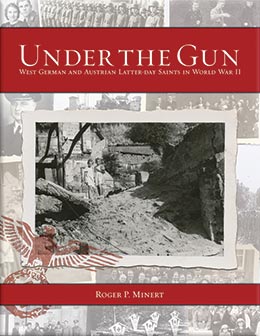Offenbach Branch
Roger P. Minert, “Offenbach Branch, Frankfurt District,” in Under the Gun: West German and Austrian Latter-day Saints in World War II (Provo, UT: Religious Studies Center, Brigham Young University; Salt Lake City: Deseret Book, 2011), 119–25.
Just a few hundred yards from the southeast boundary of the city of Frankfurt, Offenbach lies on the south bank of the Main River. Famous as the center of the leather industry in Germany, the official population of 85,128 in 1939 included 95 members of the LDS Church. [1] The branch was established there in 1900.
Church meetings were held in rented rooms at Ludwigstrasse 38, near the city center. Rosel Goeller (born 1927) recalled the conditions: “Our first meetings were in factories, and I didn’t like that because [the rooms were] too old. I didn’t like telling my friends where I went to church because everybody else who went to church went to nice chapels or large beautiful buildings. I think there was a sign outside saying that we met in those rooms. There were not many people who attended the meetings—maybe around fifty.” [2]
| Offenbach Branch [3] | 1939 |
| Elders | 4 |
| Priests | 2 |
| Teachers | 0 |
| Deacons | 6 |
| Other Adult Males | 25 |
| Adult Females | 51 |
| Male Children | 4 |
| Female Children | 3 |
| Total | 95 |
The directory of the West German Mission shows a full complement of branch leaders at work in June 1939. [4] Arthur C. Reis was the branch president and was assisted by counselors Wilhelm Rau and Johann Göller. Elly Wolf was the Young Women leader, Bertha Reis the president of the Primary, and Klara Weilmünster the president of the Relief Society. The meeting schedule was quite typical, with Sunday School at 10:00 a.m. and sacrament meeting at 7:00 p.m. All auxiliary meetings took place on Wednesday evening with the exception of the Relief Society gatherings on Monday evenings.
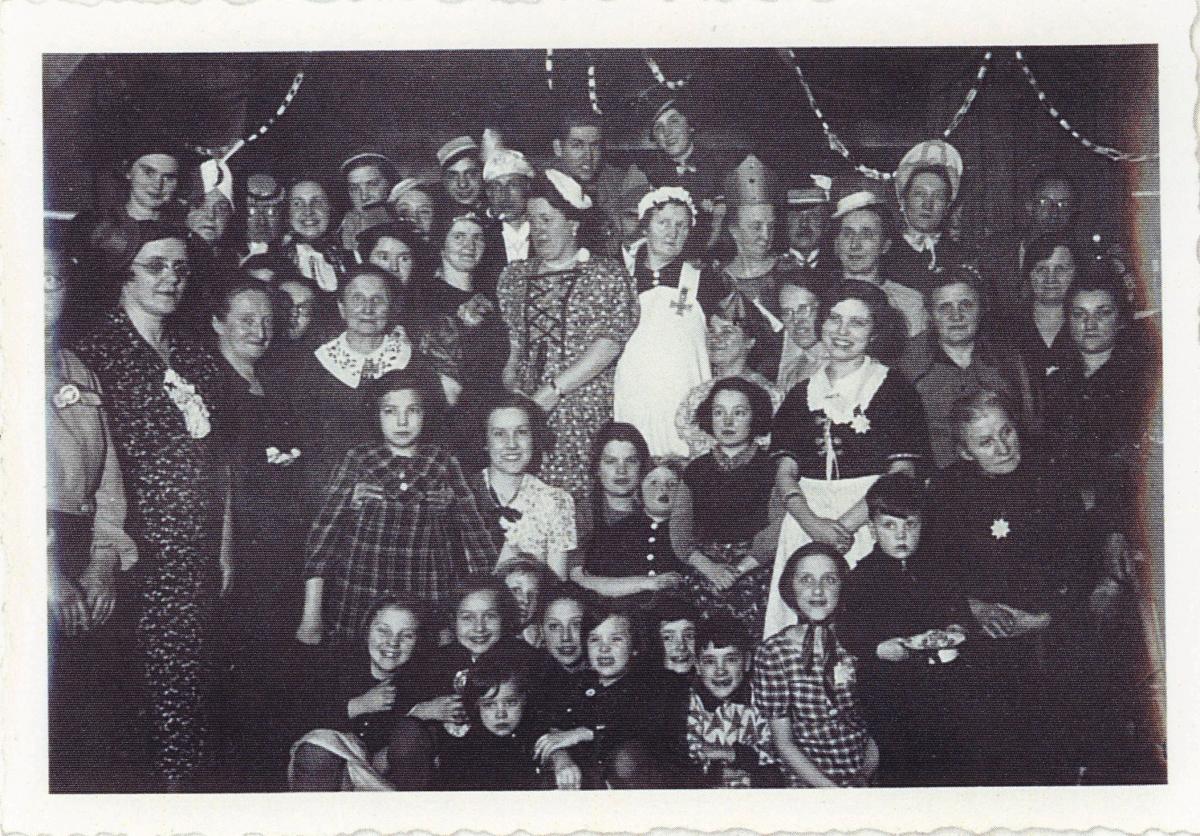 Fig. 1. A Fasching (Carnival) celebration in the Offenbach Branch in February 1939. (E. Rosenhan)
Fig. 1. A Fasching (Carnival) celebration in the Offenbach Branch in February 1939. (E. Rosenhan)
Thanks to a dedicated clerk, the minutes of branch meetings in Offenbach were kept with great precision through most of the war. The average attendance at sacrament meetings was twenty-eight in 1939. As in other branches throughout the mission, the clerk noted the number of attendees in several categories: priesthood holders, women, children, and friends. [5]
A rare indication of interaction between local police and branch leaders is reported under the date June 28, 1940: Gestapo agents visited President Reis at an unidentified location (possibly in his home) and asked him the following questions: [6]
Name of the sect: KJC [Kirche Jesu Christi] etc. and Mormonen
Address: same [as before] [had there been a previous inquiry?]
Members: 93
Preachers: none (any male member can be asked to speak)
Leader: Arthur C. Reis, warehouse manager, born in London in 1897
Meeting times: during the war only Sundays 10–12 and 4–5
Address of worship: Ludwigstrasse 32 in Offenbach [7]
Any youth groups? No
Who is the youth group leader? Nobody
Any publications? None
What kinds of meetings are held? Worship services.
A copy of the record was sent to Anton Huck at the mission office on July 20, 1940. Apparently there was no further action during the war on the part of the Gestapo in Offenbach.
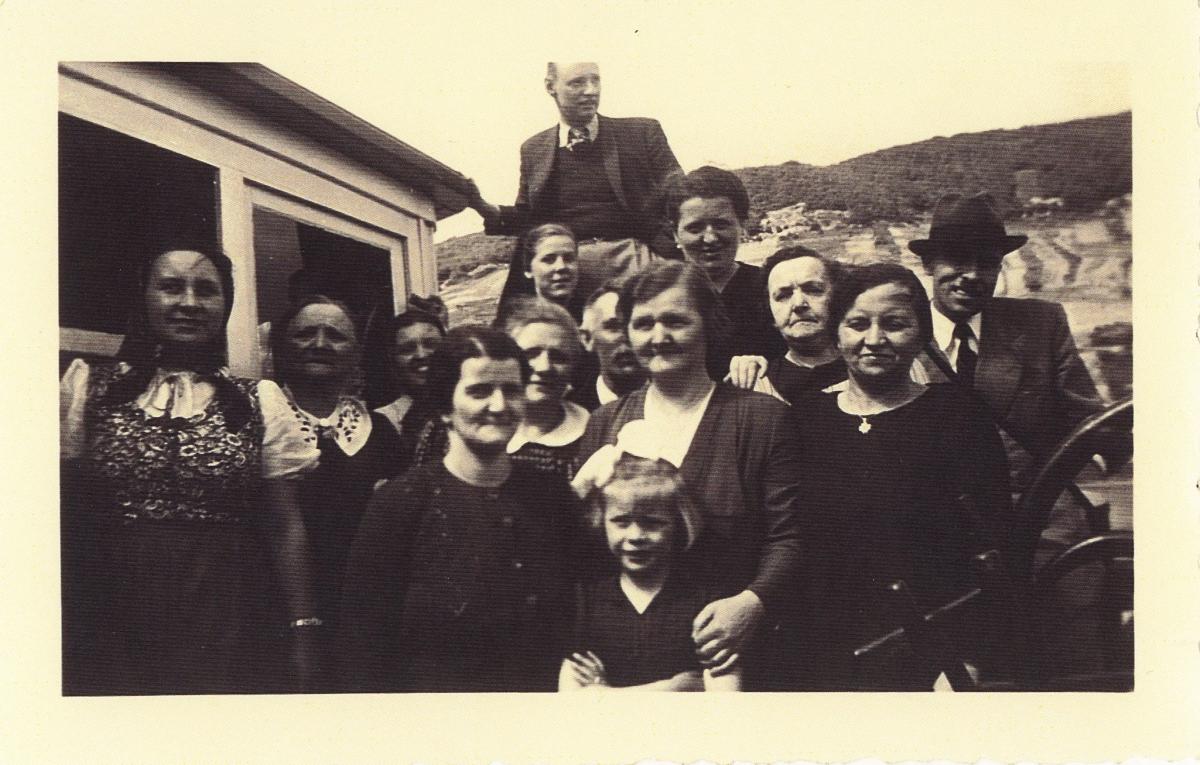 Fig. 2. Members of the Offenbach Branch joined with other Saints of the West German Mission for a Rhine River cruise at the conclusion of the mission conference on May 19, 1939. (E. Rosenhan)
Fig. 2. Members of the Offenbach Branch joined with other Saints of the West German Mission for a Rhine River cruise at the conclusion of the mission conference on May 19, 1939. (E. Rosenhan)
In late 1940, the meeting schedule was changed such that all meetings took place on Sundays, “giving all members a better opportunity to attend the meetings.” [8] The activities of the branch during the year 1941 suggest that the Saints in Offenbach were doing well in sustaining the programs of the Church. On April 6 they celebrated the anniversary of the Church, “and lots of photographs were taken” by the thirty-nine attendees. On July 24, Karoline and Brigetta Ledermann were baptized in Frankfurt, and a festival for the MIA was held on September 14. That event was especially noteworthy because forty-seven persons attended in a year that saw MIA groups discontinue meetings in branches all over Germany. In contrast, the average attendance at sacrament meeting was holding steady in 1941 at twenty-eight persons. The average declined to twenty-five during 1942. [9]
The Göller family was fortunate to live in an apartment house that survived the war. They were also fortunate that Rosel’s father was too old to be drafted (in his seventies) and could stay home with his wife. Some of their nine children had already grown up and left the home. Brother Göller was not a friend of the government, but he and his wife rarely spoke of politics in the presence of their children.
Calendar year 1943 brought significant challenges to the branch in Offenbach. President Arthur Reis became quite ill and was given blessings on several occasions by mission leaders such as Anton Huck. President Reis’s extended absence from the meetings may have led to some miscommunication, as reflected in an indignant letter written to him by Wilhelm Humbert on August 26, featuring these lines:
I have read your letter in great astonishment. I know full well that you are the branch president, but I did not know that you listen to such gossip and thus make accusations against me. You are extremely misinformed. A sister had indicated that you wanted to have certain hymns sung in order to make the meetings more spiritual. Is that my fault? To this date, I have done nothing without your permission. I would have visited you had I not suffered an accident on Monday. We were told that nobody should visit you because it might upset you (that is what they told us on Sunday). In order to avoid this gossip and backbiting, I ask that you immediately release me from all callings. In my office as an elder I do not answer to any women. I want you to understand this very clearly. I have also informed Anton Huck of this matter.
Your brother in the gospel
Please excuse my poor handwriting.
Please read “Evangeliumslehre” pages 263–264: I have always acted accordingly
The reference to “women” in Brother Humbert’s letter apparently included Sister Elly Wolf, who was president of the YWMIA when the war began and had since been called to work in the Relief Society. She wrote the following to President Reis on October 4:
Dear Brother Reis,
I am enclosing the book for the Relief Society with the copies sent to me as well as the bank book and wish to be released from all of my callings in the branch. Should anything remain unclear, please write me about it. I have a happy home and thus forbid visits by branch members and will not allow my home to be destroyed by the gossip and backbiting of the branch. I hope you understand this so that I do not have to use legal means to prevent visits. I will send all visitors away, regardless of who it is! . . . I will be sending you my monthly report in the next few days. I am not at home much, because I work for the welfare services. Should there be any unresolved matters with the lesson manuals, you may do with the money what you feel is correct. The balance of the MIA funds and the Gleaner funds should be the same when they are opened again. I will close now and wish you best regards for your life.
Heil Hitler!
Sister Elly Wolff
The reader is left to speculate as to the origin of the conflict, but at the very least it would seem that some amount of gossip had approached the level of slander, and the writers of the letters quoted above felt that they had been victimized and their reputations sullied. There is no indication in the branch records through 1946 that Sister Wolf attended church meetings in Offenbach again, but Brother Humbert returned by 1944. [10]
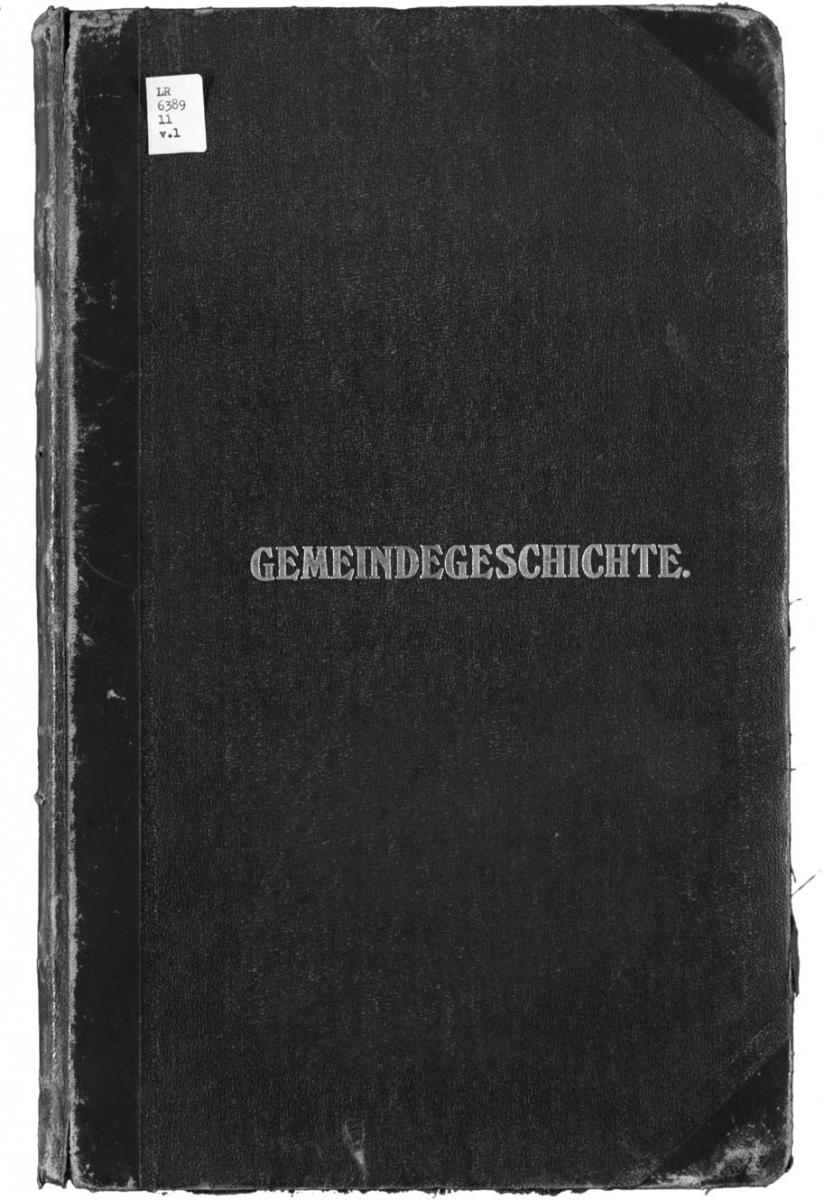 Fig. 3. This branch history book survived for more than six months in the rubble of a building that was destroyed by bombs in November 1944. (Church History Library)
Fig. 3. This branch history book survived for more than six months in the rubble of a building that was destroyed by bombs in November 1944. (Church History Library)
Shortly after the climax of the crisis, President Reis died following a lengthy illness; branch membership records indicated that his illness was somehow related to air raids. In the apparent absence of a qualified replacement, Brother Valentin Schlimm of the Frankfurt/
The Allied air offensive against Frankfurt and Offenbach intensified in 1944 and the branch clerk made many notations regarding this problem. The meeting rooms were slightly damaged on March 18 and four days later were totally destroyed. By May, the Saints were meeting in the home of a Sister Sorawia at Grosse Marktstrasse 13. Air-raid alarms caused interruptions in meetings on five different Sundays from July through November.
Rosel Goeller recalled the following about the constant air raids and false alarms:
Air raids were terrifying. I took my Book of Mormon with me when we went into the basement. I would say that we were not completely safe there; it was not like a regular concrete bunker. We sat in the basement until they told us [via the all-clear siren] that we could go back upstairs. It wasn’t usually all night long. . . . It was dark in those basements; there was no light. Sometimes, when we came out of the basement, we saw buildings burning.
The report dated August 30–31, 1944, includes a sad event: “Sister Margarethe Leutenbach nee Göller died on the way to the air raid shelter. She will be buried in the new cemetery.” [12] Margarethe’s younger sister, Rosel, recalled that Margarethe “was running to the bunker from her home, and she collapsed and died.” Readers are reminded that the trip to the shelter was not a simple walk. City dwellers had to deal with inclement weather, rubble from damaged buildings on damaged streets, the drone of the engines of approaching airplanes, and the worst hazard of all—being under stress or in panic under blackout conditions.
The branch clerk did not identify himself in the detailed accounts of meetings in the Offenbach Branch, but a careful study of the records from 1941 to 1945 suggests that he was Rudolf Buchmann. We have him to thank for his diligence, evidenced perhaps best by his comments under the date November 5, 1944:
House service and fast meeting:
Branch President Brother Schlimm presided. Opening hymn 221; invocation by Brother Humbert; hymn no. 12; sacrament blessed by President Schlimm and passed by Brother Buchmann. The meeting was interrupted by air-raid sirens. We could not come back after the air raid. Our home in which we had conducted the meeting received a direct hit.
After 6 ½ months [May 20, 1945] I was able to rescue this book from the ruins. I had not been able to purchase a new book in the meantime.
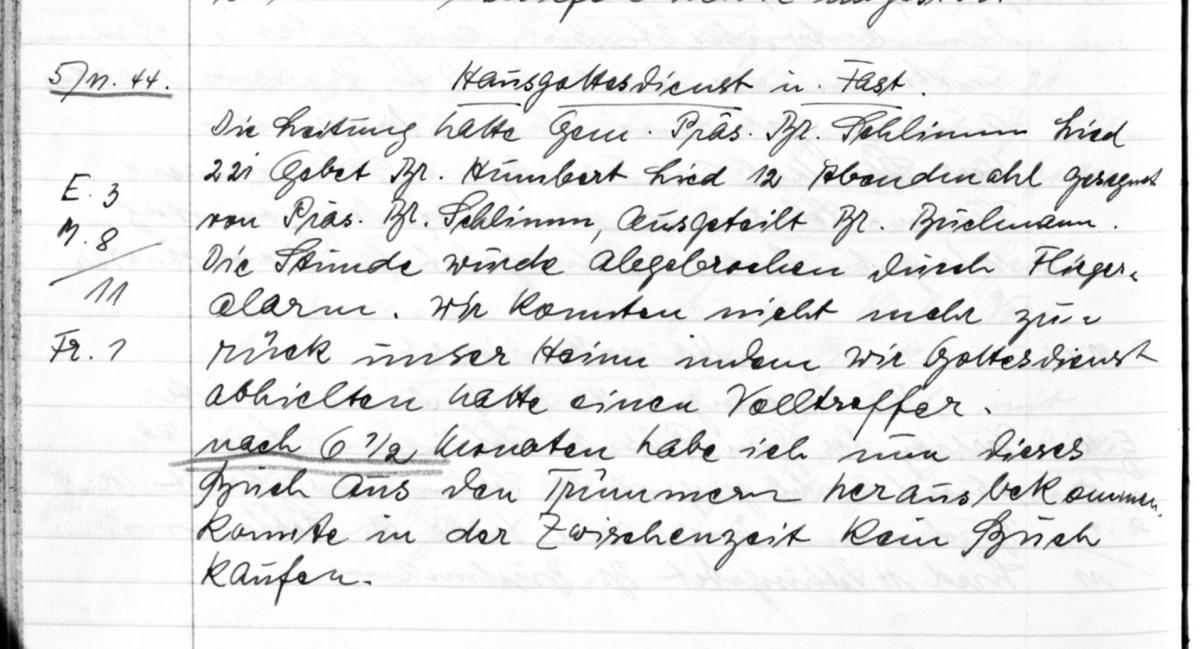 Fig. 4. This entry in the Offenbach Branch history explains how the book shown above came to be buried under the rubble of a collapsed building from November 1944 until May 1945. (Church History Library
Fig. 4. This entry in the Offenbach Branch history explains how the book shown above came to be buried under the rubble of a collapsed building from November 1944 until May 1945. (Church History Library
While it is clear that the branch clerk was dedicated to his calling of keeping records for all meetings, this man did much more. He must have been very discouraged that his record book was buried in the rubble during the air raid. He tried unsuccessfully to replace the book and found no source of even individual sheets of paper since wartime shortages were acute. During the twenty-eight weeks the branch record book lay buried within the ruins of the building where either the branch met or the clerk lived, the ruins of the building would have been subjected to the winter weather. Germany traditionally receives a minimum of five inches of precipitation per month, and one would assume that the book would be wet or even soaked and rotting from water seeping through the wreckage. The record book may have been kept in a cabinet or a desk drawer that remained intact and watertight. One can imagine that the clerk was overjoyed when his search for this record (and likely other items of branch or personal value) was a success.
Rosel Goeller’s recollection of the end of the war is as follows:
When the Americans came into Offenbach, I was there. I watched the tanks and the soldiers coming in and going from house to house while we were hiding. I was afraid because we had heard rumors [about the American soldiers]. But in the end, the Americans were not too bad to us. It was mostly the [Nazis] who told us that we should not believe the Americans. The soldiers did not come into our home to look for anything.
It is apparent that the members of the Church in Offenbach did their best to continue holding meetings. On June 7, the following report was made:
[Mission leader Anton] Huck visited the meeting and blessed our temporary branch pres. Wilhelm Humbert. Later he visited the secretary’s [Rudolf Buchmann’s?] house: “I told him that we had a chance to buy a building in which we could meet and bombed-out members could live. He replied that the mission does not purchase buildings, based on the fact that our prophet, Heber J. Grant, had died on May 15 of this year and that he said on his death bed that the Second Coming of Christ will happen very soon, it could not be far away.” [13]
It should come as no surprise that after the cataclysmic events of World War II, some Church members believed that the end of the world was approaching. The veracity of such a statement likely cannot be confirmed.
The records of the city of Offenbach indicate that only 467 people died in air raids there, but approximately 40 percent of the city was destroyed during twenty-eight air raids. At least 2,229 soldiers lost their lives. The war ended there for all practical purposes when the American army entered the city on March 26, 1945. [14]
A brief history of the Offenbach Branch offers only one sentence regarding the experience of the members of the Church there during the war years: “Due to the severe lack of living space after the war, the branch had no suitable meeting rooms for one year. Branch meetings and worship services were held in the apartment of Sister Sorawia at Grosse Marktstrasse 13 in Offenbach.” [15]
The final comment in the branch records connected with the war was made on July 29, 1945: “A memorial program for the fallen heroes: The new branch president is Valentin Schlimm [of Frankfurt]; Anton Huck was also there.” [16] No names of the soldiers are recorded, but lists compiled by the office of the West German Mission include the names of four soldiers from this branch who lost their lives while serving in the Wehrmacht.
In Memoriam
The following members of the Offenbach Branch did not survive World War II:
Margarethe Göller b. Offenbach, Hessen, 17 May 1913; dau. of Johann Martin Göller and Elisabeth Fr. Tron; bp. 27 May 1921; conf. 27 May 1921; m. 12 Oct 1938, Wilhelm Lautenbach; k. in air raid Offenbach 30 Aug 1944 (CHL microfilm 2458, form 42 FP, pt. 37, 298–99; IGI; FHL microfilm 68802, no. 31)
Albert Hausch b. Leimen, Heidelberg, Baden, 10 May 1909; son of Johann Hausch and Katharine Kalbeck; bp. 24 Aug 1934; conf. 24 Aug 1934; k. in battle France 21 Dec 1943 (CHL microfilm 2458, form 42 FP, pt. 37, 298–99; IGI; FHL microfilm 68802, no. 134; FHL microfilm 68791, no. 496)
Johann Karl Hausch b. Leimen, Heidelberg, Baden, 10 May 1909; son of Johann Hausch and Katharine Kalbeck; bp. 1 Oct 1932; conf. 2 Oct 1932; ord. deacon 22 Apr 1934; m. 16 Dec 19—, Anna M. Jacob (Löffel); corporal; k. in battle France 17 Dec 1944; bur. Daleiden, Prüm, Rheinland (FHL microfilm 68802, no. 128; CHL microfilm 2458, form 42 FP, pt. 37, 298–99; FHL microfilm no. 68791, no. 400; www.volksbund.de; IGI)
Otto Kallenbach b. Offenbach, Hessen, 12 Mar 1916; son of Michael Kallenbach and Dorothea Kath. Jacobi; bp. 8 Oct 1925; conf. 8 Oct 1925; lance corporal; k. in battle Dubrowka, Wjasma, Russia, 2 Oct 1941 (FHL microfilm 68802, no. 64; FHL microfilm 68791, no. 949; www.volksbund.de)
Rudolf Kallenbach b. Offenbach, Hessen, 25 Aug 1910; son of Michael Kallenbach and Dorothea Kath. Jacobi; bp. 20 Jun 1925; conf. 20 Jun 1925; ord. deacon 11 Feb 1929; m. 21 Dec 1932 or 1933, Katharina M. Trapp; corporal; k. in battle France 9 Jun 1940; bur. Noyers-Pont-Maugis, France (FHL microfilm 68802, no. 65; FHL microfilm 68791, no. 910; www.volksbund.de; IGI)
Katharina May b. Weiten Gesäß, Erbach, Hessen, 20 May 1861; dau. of Georg May and Dorothea Kropp; bp. 22 May 1941; conf. 22 May 1941; m. Frankfurt/
Anna Marie Rall b. Offenbach, Hessen, 27 Sep 1861; dau. of Karl A. Rall and Katharina Z. Diez; bp. 31 Jul 1900; conf. 31 Jul 1900; m. —— Hübner; d. senility 28 Mar 1943 (FHL microfilm 68791, no. 76; Frankfurt District book II; IGI)
Albert Rau b. Offenbach, Hessen, 10 Apr 1929; son of Wilhelm Waldefang Rau and Ida Esswein; bp. 10 Oct 1937; conf. 10 Oct 1937; d. injuries from incendiary bomb, Offenbach, 25 Mar 1944 (CHL microfilm 2458, form 42 FP, pt. 37, 298–99; PRF; FHL microfilm 68802, no. 79)
Emma Waltraut Rau b. Offenbach, Hessen, 26 Jul 1941; dau. of Wilhelm Waldefang Rau and Ida Esswein; d. Offenbach cramps, 28 Mar 1942 (CHL LR 6389 11, 156)
Arthur Charles Reis b. London, England, 31 Aug 1897; son of Charles A. Reis and Betha H. Steuck or Steuch; bp. 17 May 1926; conf. 17 May 1926; ord. deacon 13 Feb 1927; ord. teacher 15 Sep 1930; ord. priest 7 Apr 1935; ord. elder 22 Mar 1936; m. 12 May 1928, Minna Frieda Richter (div.); 2m. 28 Mar 1934, Elisabeth K. Heck; d. health complications due to air raid 24 Oct 1943, bur. 28 Oct 1943 (FHL microfilm 68802, no. 84; FHL microfilm 68791, no. 995; IGI)
Kathinka Weber b. Offenbach, Hessen, 21 Oct 1870; dau. of Wilhelm Weber and Maria Geider; bp. 11 Aug 1907; conf. 11 Aug 1907; d. 1941 (FHL microfilm 68791, no. 145; Frankfurt District book II; IGI)
Pauline Mathilda Bertha Zacharias b. Langensalza, Erfurt, Sachsen, 11 Nov 1867; dau. of Christian Heinrich Rudolf Zacharias and Therese Eleonore Klara Wiegand; bp. 27 Jan 1927; conf. 27 Jan 1927; m. Langensalza 12 Aug 1911, Philipp Ludwig Reinhard Houy; d. senility 26 Oct 1943 (FHL microfilm 68791, no. 191; FHL microfilm 162790, 1935 census; Frankfurt District book II; IGI)
Margarethe Zintel b. Worms, Rheinhessen, Hessen, 8 May 1875; dau. of Katharina Zintel; bp. 28 Jun 1939; conf. 28 Jun 1939; m. 25 Mar 1930, Hieronymus Blumöhr; d. cancer 9 Jan 1941 (FHL microfilm 68802, no. 156; FHL microfilm 68791, no. 566)
Notes
[1] Offenbach am Main city archive.
[2] Rosel Goeller Meyer, interview by the author, Salt Lake City, November 3, 2006.
[3] Presiding Bishopric, “Financial, Statistical, and Historical Reports of Wards, Stakes, and Missions, 1884–1955,” 257, CR 4 12.
[4] West German Mission branch directory 1939, CHL 10045 11.
[5] Offenbach Branch general minutes, CHL LR 6389 11.
[6] Ibid., 140.
[7] Apparently the branch had moved three buildings down the street in the previous eight months, confirming what Rosel Goeller said about various locations.
[8] Offenbach Branch general minutes, 143.
[9] Ibid., 152–56.
[10] The fact that Brother Humbert was asked later during the war to serve as the temporary branch president suggests that he harbored no ill will toward the gossipers.
[11] Offenbach Branch general minutes, 170–72.
[12] Ibid., 178.
[13] Ibid., 182.
[14] Offenbach am Main city archive.
[15] Johann Ludwig Schneider, collected papers, CHL MS 13829.
[16] Offenbach Branch general minutes, 184.
